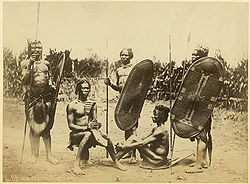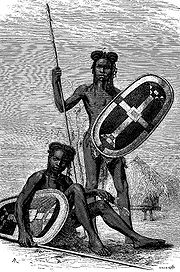- Zande people
-
- Niam-Niam redirects here. Niam-Niam can also refer to a Mancala game with a 2×8 and stores.
Azande 
Zande men with shields, harp Total population 1,000,000-3,800,000 Regions with significant populations Democratic Republic of the Congo, South Sudan, Central African Republic Languages Religion The Azande ("Zande" as an adjective) are a tribe of north central Africa. Their number is estimated by various sources at between 1 and 4 million.
They live primarily in the northeastern part of the Democratic Republic of the Congo, in South Sudan, and in southeastern Central African Republic. The Congolese Azande live in Orientale Province, specifically along the Uele River; and the Central African Azande live in the districts of Rafaï, Zémio, and Obo.
Contents
Language
The Azande speak Zande, which they call Pazande. (Their language is also called Zandi, Azande, Sande, Kizande, Badjange). Zande is an Adamawa-Ubangi language.
Population
The Zande population is spread over three countries, namely South Sudan, the Democratic Republic of the Congo and the Central African Republic—the effect of colonial borders. In most cases, people use the estimate in Sudan to determine the total Zande population, an approach that does not show correct estimates.
Agriculture
The Azande are mainly small-scale farmers. Crops include maize, rice, groundnuts (also known as peanuts), sesame, cassava and sweet potatoes. Fruits grown in the area include mangos, oranges, bananas, pineapples, and also sugar cane. Zande land is also full of oil palms and sesame.
From 1998 to 2001, Zande agriculture was boosted since World Vision International was buying agricultural produce. The Azande managed to supply enough maize, soya beans, sesame, sorghum and groundnuts to feed the whole population of southern Sudan.[citation needed]
History and traditional beliefs
Most Azande traditionally practiced an animist religion, but this has been supplanted to a large extent by Christianity. Other traditional beliefs include magic and witchcraft. Among the Azande, witchcraft is believed to be an inherited substance in the belly which lives a fairly autonomous life, including performing bad magic on one's enemies. Witches can sometimes be unaware of their powers, and can accidentally strike people to whom the witch wishes no evil. Because witchcraft is believed to always be present, there are several rituals connected to protection from and cancelling of witchcraft that are performed almost daily. When something out of the ordinary occurs, usually something unfortunate, to an individual, the Azande may blame witchcraft, just as non-Zande people might blame "bad luck".
Oracles are a way of determining from where the suspected witchcraft is coming, and were for a long time the ultimate legal authority and the main determining factor in how one would respond to the threats.
Military
The weaponry of the Zande was showcased on the cable television show, Deadliest Warrior. The Zande were renowned for their military prowess, using a mix of Iron Age and Stone Age weapons to great effect on raids to gain new resources, including the makraka, a sickle-bladed weapon capable of decapitation and the makrigga, a seven foot spear with backwards facing hooks effective at inflicting massive ripping trauma upon being pulled out of a wound. The iron kpinga throwing knife functioned much like a scaled up shuriken, with cutting edges protruding from almost every angle and the ability to inflict deep stabbing wounds from a distance, as well as functioning as an effective close up stabbing and slashing weapon. They used bows with the arrows dipped in a mix including strychnine, which is used in rat poison, capable of inducing severe pain, muscle spasms, and death in those hit.
The Zande used intimidation as a weapon, filing their teeth to take on a frightening appearance and using a distinctive chant of "nyam-nyam", an adaptation of the name "great eaters" given to them by other tribes.
Folklore
E. E. Evans-Pritchard and other anthropologists have paid special attention to Zande stories about Tule, also known as Ture. Tule (pronounced [ˈtule]), which means "spider" in Zande, is sometimes portrayed as a trickster, similar to Anansi or Br'er Rabbit.
The name
 Niam-Niam warriors
Niam-Niam warriors
The word Azande means the people who possess much land, and refers to their history as conquering warriors.
There are many variant spellings of Azande, including: Zande, Zandeh, A-Zandeh, Sandeh, etc.
The name Niam-Niam (or Nyam-Nyam) was frequently used by foreigners to refer to the Azande in the 19th and early 20th century. This name is probably of Dinka origin, and means great eaters in that language (as well as being an onomatopoeia), supposedly referring to cannibalistic propensities. This name for the Azande was in use by other tribes in South Sudan, and later adopted by westerners. Naturally, today the name Niam-Niam is considered pejorative.
Another tribe called the Niam-Niams were a tribe from ancient legend, said to have short tails.
See also
Notes
References
- Spike-TV (2010) 'Deadliest Warrior: Aztec Jaguar vs Zande Warrior'
- Evans-Pritchard, E. E. (1979) ‘Witchcraft Explains Unfortunate Events’ in William A. Lessa and Evon Z. Vogt (eds.) Reader in Comparative Religion. An anthropological approach. Fourth Edition. New York: Harper Collins Publishers. pp. 362–366
- Evans-Pritchard, E. E. (1967) The Zande Trickster. Oxford: Clarendon Press.
- Evans-Pritchard, E. E.1937 Witchcraft, Oracles and Magic Among the Azande. Oxford University Press. 1976 abridged edition: ISBN 0-19-874029-8
External links
- Equatorians Abroad
 Chisholm, Hugh, ed (1911). "Niam-Niam". Encyclopædia Britannica (11th ed.). Cambridge University Press.
Chisholm, Hugh, ed (1911). "Niam-Niam". Encyclopædia Britannica (11th ed.). Cambridge University Press.- Ethnologue entry on the Zande language.
- [1], includes interviews with experts on Zande military practices and weaponry and demonstration on simulated human bodies.
Categories:- Ethnic groups in Sudan
- Ethnic groups in South Sudan
- Ethnic groups in the Central African Republic
- Ethnic groups in the Democratic Republic of the Congo
Wikimedia Foundation. 2010.
